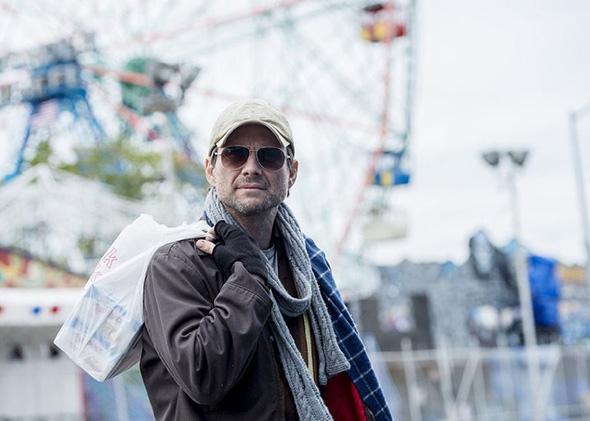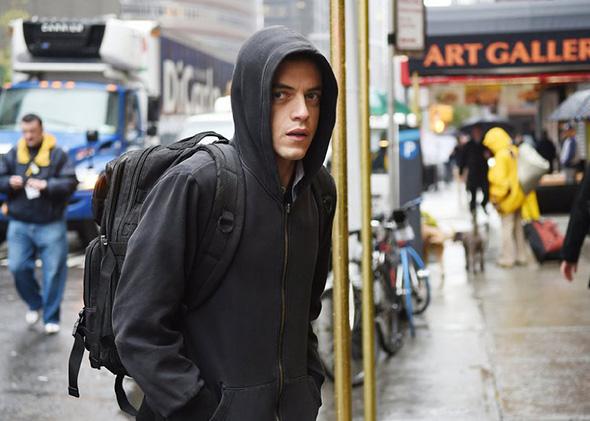Real misfits—disturbing, unappealing, unlovable misfits—make for poor Hollywood protagonists. It takes some faith to inject a genuinely alienating hero into a film or TV show. But ever since the broader world of tech has gained a whiff of cool over the past decade or so, Hollywood’s portrayals of hackers, programmers, and other screen-strapped geeks have tended to sugarcoat the frequently unvarnished and even unappealing aspects of a culture that prides itself on not caring about the mainstream. I’m not bemoaning the lack of shy nerds with hearts of gold here, but of awkward and even abrasive characters who talk too loudly, can’t follow conversational cues, transgress boundaries obliviously, and harbor conspiracy theories or other unappealing ideas—like a lot of actual hackers out there. We forget that people detest savant types for reasons beyond their smarts, and a lack of social graces is one of them.
Elliot, the protagonist of the new USA Network drama Mr. Robot, comes far closer to this type than an American television show has dared for a while. (Elliot isn’t the titular Mr. Robot—that’s Christian Slater.) As played by Rami Malek, Elliot doesn’t have the charisma of Benedict Cumberbatch’s Sherlock or the anti-charisma of Hugh Laurie’s Dr. House. Unlike Tony Shalhoub’s Adrian Monk, he’s not a collection of quivering nerves and endearing eccentricities. These characters—all nerds of one sort or another—are fundamentally capable of functioning in society, and Elliot really isn’t. He and the world just don’t hook up in the right way. Taking copious drugs in order to function, he carries a vacant and flattened affect, neither making eye contact with anyone nor turning away when they look at him. With his emaciated face and sunken eyes, Malek gives an impression of emptiness, paranoia, and above all disconnection.
As Elliot stumbles through the less gentrified sections of New York City and trances out in front of computer screens, we mostly hear from the inside of his head, and these monologues often lend some deadpan humor to the show. Bemoaning “the illusion of choice,” he mumbles: “If our only option is Blue Cross or Blue Shield, what the fuck is the difference? … In fact, aren’t they the same?”
So Elliot’s “good guy” status, his role as the show’s protagonist, is undermined by the unmistakable fact that he’s not all there. When he takes down an Internet café owner who also happens to run a child porn ring, it’s easy to cheer. When he cyberstalks his own therapist so he knows why she suddenly became emotional one day, it’s more unnerving. And when, after being sucked into a plot to take down an executive of E Corp, Elliot is recruited into an Anonymous-like org (cleverly named fsociety, which I hope is a fsck reference) headed up by the voluble Mr. Robot, you figure only disaster will result from the combination of anarchic ideals and chronic maladjustment. Slater has an easy job portraying the Julian Assange–like Mr. Robot, grandiosely plotting the downfall of those who have wronged the world. He’s pretty much the grown-up version of his sociopath from Heathers, convincing when he’s trying to win you over, frightening when the mask slips.

Photo by David Giesbrecht/USA Network
Hollywood’s portrayals of nerds have reached a compromised between honesty and affability for decades. The “cool nerds” of 1985’s Real Genius were a touchstone for me and many others, but while director Martha Coolidge did enough research at Caltech to get lots of details right, the acting feels pretty off the mark, with Val Kilmer and company coming off like John Hughes characters with higher IQs. (Exception: Michelle Meyrink’s spastic Jordan, whose vocal mannerisms and tics are uncannily on-the-nose, resulting in probably the best portrayal of its kind, until Heather Matarazzo and Tina Majorino came around.) I have a soft spot for frequent nerd actor Eddie Deezen, who was rejected from Revenge of the Nerds for being too nerdy. But programs like the soggy The Big Bang Theory and cutesy, dimwittish Silicon Valley capture very little of the actual anomie that drives many people into the recesses of geekdom.
Mr. Robot’s Elliot isn’t entirely unprecedented, of course. He has traits in common with the skewed characters of Mike White (in places like Chuck and Buck and Enlightened), Dore Mann’s tormented salesman Keith in Ronald Bronstein’s Frownland, and the hikikomori protagonist of the anime series Welcome to the NHK. He’s also reminiscent of the creepy, paranoid assassin Jessica Hyde (Fiona O’Shaughnessy) in the brilliant British series Utopia—a character whose traumatic upbringing left her emotionally insensate and ruthless. Not coincidentally, nerd-misfit portrayals are generally worst at capturing women. The best recent depiction of a female coder was probably Rooney Mara as Lisbeth Salander in the American remake of The Girl With the Dragon Tattoo. Like Malek and O’Shaughnessy, Mara turns off the lingua franca of microgestures and affect to unsettling effect. Shame about the movie itself, an exploitation flick masquerading as feminist finger wagging. (The Swedish title was actually Män som hatar kvinnor, or “men who hate women.”)
Unfortunately, the women of Mr. Robot don’t live up to O’Shaughnessy, Meyrink, or Mara’s transcendence of cliché. Portia Doubleday, who was fantastic in Youth in Revolt, isn’t given much to do in the two episodes I’ve seen (the first of which aired on Wednesday), while Carly Chaikin’s grating portrayal of borderline hacker Darlene led my wife to throw down her dinner and shout, “This is why there are no women in computer science!” before explaining the salutary effect that CSI and Bones had on female forensic science participation. Most depictions of female hackers are wish-fulfillment fantasies—punky ice queens like Trinity in The Matrix and Lisbeth Salander in the Swedish Dragon Tattoo movies, or the wholesome yet sexy den mothers of AMC’s dull Halt and Catch Fire—but they don’t have to be. Maybe it’s time to go back to Caltech.
Beyond that disappointment, though, Mr. Robot creator Sam Esmail, who directed the very odd film Comet, acquits himself very well. Two episodes in, I don’t have much of an idea where the show is going, especially because of its hopscotches in genre and tone. When you place a character like Elliot in a conspiracy thriller, there’s no clear place to point and say, “This is real,” which results in a pervasive sense of mystery. Is Mr. Robot a full-on psychopath? Is it all a con? Is Elliot crazier than he lets on? So far, the show hasn’t quite made good on the promise of Elliot’s alienation—probably because it can’t. We see Elliot’s preternatural abilities at reading people to figure out their agendas and needs, even if he can’t always do much about them. This serves the show’s plot well, but it evades the real tragedy of hackers like Elliot—that frequently their disconnection from reality isn’t at the interactive level but the cognitive level. A real Elliot would be catastrophically wrong about his assessments of people as often as he was right, which hasn’t happened yet: Elliot’s assessments have been remarkably accurate for someone of his character. Mr. Robot may ultimately be a fantasy, too—of a troubled soul who’s more perceptive than the rest of us rather than just unpredictably volatile. Does the show itself realize that?
This article is part of Future Tense, a collaboration among Arizona State University, New America, and Slate. Future Tense explores the ways emerging technologies affect society, policy, and culture. To read more, visit the Future Tense blog and the Future Tense home page. You can also follow us on Twitter.
